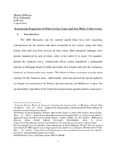Sentencing Disparities of White Collar Crime and Non-White Collar Crime

View/
Author
DiBiagio, Michael T.
Subject
Washington and Lee University, Shepherd Poverty Program
Sentences (Criminal procedure)
Pre-trial procedure
White collar crimes
Ethics
Metadata
Show full item recordDescription
Capstone; [FULL-TEXT RESTRICTED TO WASHINGTON AND LEE UNIVERSITY LOGIN] Michael T. DiBiagio is a member of the Class of 2019 of Washington and Lee University School of Law. 97% of criminal prosecutions end in a plea deal. Thus, the sentence recorded by the United States Sentencing Commission is most likely a sentence negotiated during a pre-trial agreement. This paper will show that a disparity in sentencing exists between white-collar sentencing and non-white collar sentencing through the amount of the “discount” from the United States Sentencing Guidelines that a criminal receives during that pre-trial agreement. To begin, this paper will introduce literature that I have researched that discusses the disparity and why it occurs. Next, the paper will explain a model which illustrates the disparity in simplistic terms. And finally, the paper will adjust the factors of the model and compare that adjustment with ethical theories of equity, ethics, and fairness. [From Introduction] Michael DiBiagio